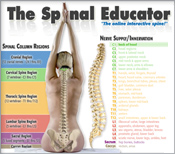| Lower Back and the Chiropractic Lifestyle Chiropractic care is safer and often more effective than surgery. Many research projects show conservative chiropractic care is safer and often more effective than back surgery. The chiropractic approach is to help restore a more normal motion and position of affected spinal bones with specific chiropractic adjustments. The simplicity and success of this approach has been documented in numerous research projects and has helped many patients avoid risky surgery. Chiropractic doctors often consult with neurologists, radiologists, and orthopedic specialists when designing care programs for patients with disc involvement. Surgical treatment often involves removing these facet joints, exposing the spinal cord. Another cause of lower back pain can be a bulging disc putting pressure on the spinal cord or a nearby nerve root. The result is often numbness, tingling, or pain down the leg. Cutting away the bulging disc tissue can permanently alter its ability to separate and cushion the adjacent bones. This rarely addresses the underlying structural cause(s) of the problem. Many of the pain-sensing nerves of the spine are in the facet joints, the two interlocking “fingers” at the back of each spinal bone. The normally smooth surfaces on which these joints glide, can become rough, irritated, and inflamed. Magnetic Resonance Imaging is often used to show the extent of soft tissue damage. Find out if yours is a chiropractic case and enjoy the positive results that millions of patients have discovered. Get started today! Loss of work and untold suffering. Low back pain results in millions of dollars of lost work and untold suffering every day. Many factors can be responsible for low back pain. Improper sitting or lifting, overexertion, trauma, or inherited spinal abnormalities may contribute to the cause. Your chiropractor is an expert at using specific chiropractic adjustments to help improve spinal function. THE CHIROPRACTIC LIFESTYLE Chiropractors are experts in the care of the bones, nerves, muscles and connective tissues that make up about 60% of your body. All of the joints in your body are part of this musculo-skeletal system and its optimal function is necessary for overall good health. Ask your Doctor of Chiropractic for more information about a care program that may include specific spinal adjustments, exercise recommendations, nutritional advice or other conservative methods of care based on your health history, age, current condition and lifestyle.
REFERENCES:
Buerger, A., Ph.D., Greenman, R., D.O., Validation of Spinal Manipulation, Charles C. Thomas Company, 1985. Cox, J., D. C., Low Back Pain, Mechanism, Diagnosis and Treatment, 4th edition, Williams and Wilkins, 1990. Faye, L., D.C., Good Bye Back Pain, Tale Weaver Publishing, 1990. Low Back Pain; The $50 Billion Problem, Conference sponsored by the Institute for Low Back Care, Abbott Northwestern Hospital, Minneapolis, Minnesota, September 30, 1982. Kirkaldy-Willis, W., M.D., Managing Low Back Pain, 3rd edition, Churchill Livingstone, 1993. Manga, P., Ph.D., Angus, D., M.A., Papadopoulos, C., M.H.A., Swan, W., The Effectiveness and Cost-Effectiveness of Chiropractic Management of Low Back Pain, (funded by the Ontario Ministry of Health) p. 104, August, 1993. Markey, P., D.C., Managing Disorders of the Lumbar Spine, 2nd edition, 1986. Rothman, M.D., Simone, M.D., The Spine, 3rd edition, W.B. Saunders, 1992. Stork, M.D., Bradley, M.D., Magnetic Resonance Imaging, 2nd edition, Mosby Yearbook, 1992. White, A. A., M.D. and Panjabi, M. M., Ph.D., Clinical Biomechanics of the Spine, 2nd edition, J. B. Lippincott, 1990.
©2002 Back Talk Systems, Inc. (800) 937-3113 (303) 277-9990 www.backtalksystems.com |
1750 West Broadway Street, Suite 108 | Oviedo, Florida 32765
Tel: (407) 977-7233 | Fax: (407) 359-6822
Office Hours - call for appointment times
Oviedo Florida Chiropractor Chiropractors Chiropractic Doctors
Copyright 2024 - ChiroPlanet.com
Privacy Notice - Admin

